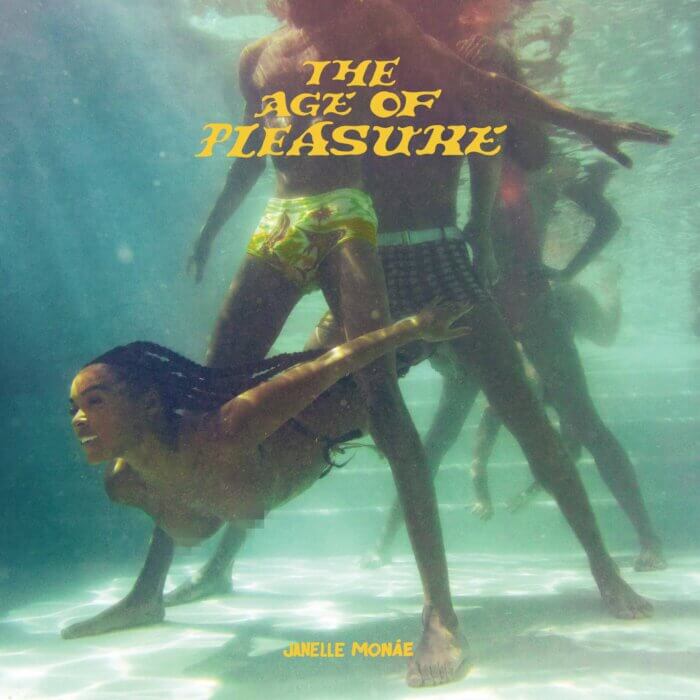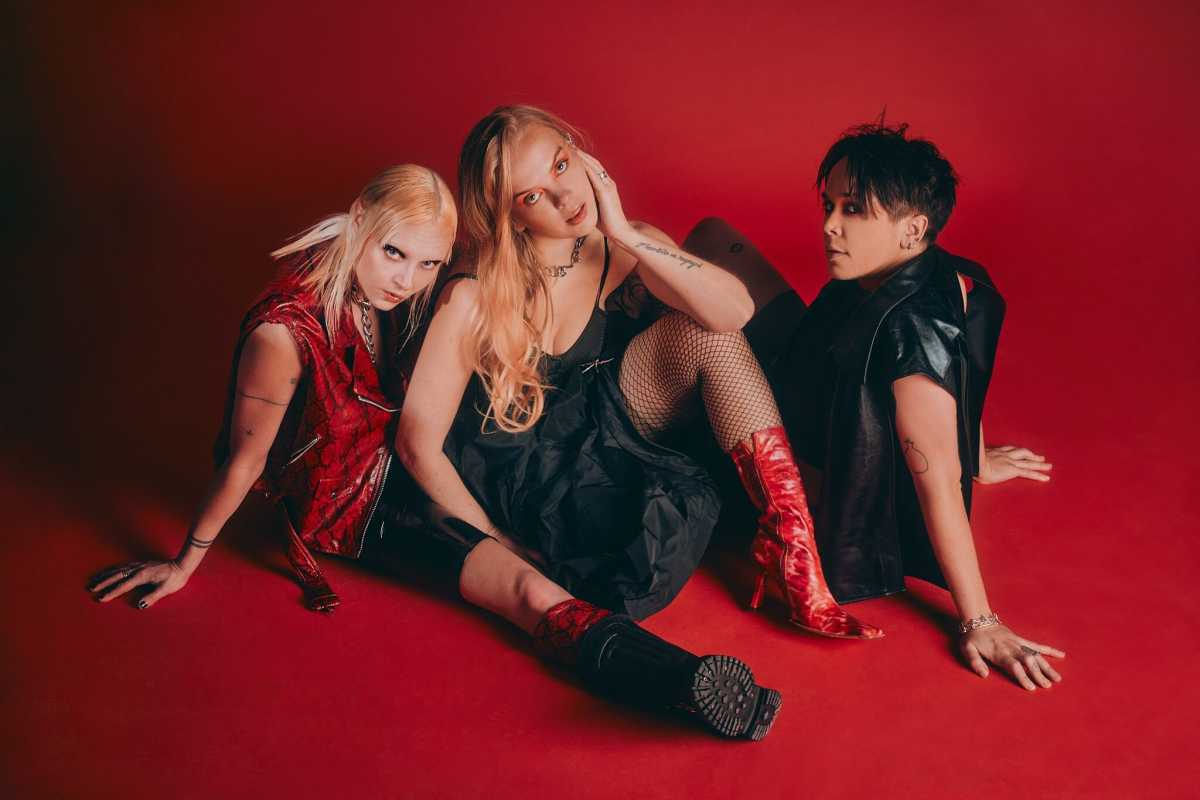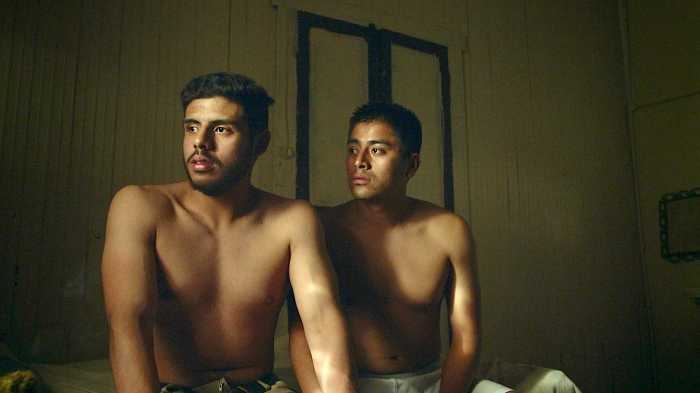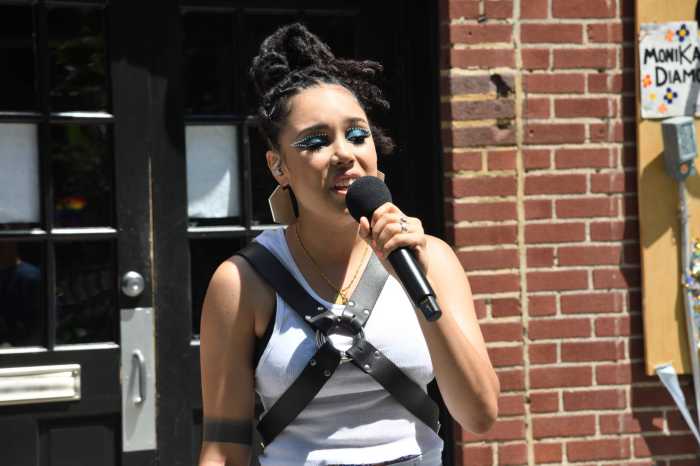In June, we turn to the long-awaited fourth album by pansexual, non-binary R&B singer Janelle Monae and the third album by rock band Dream Wife, two of whose members are queer.
Janelle Monae | “The Age of Pleasure” | Atlantic

When Monae came out as pansexual in 2018, they said “I consider myself to be a free-ass mother**ker.” On their first two albums, that freedom manifested in elaborate sci-fi concepts about their android alter ego Cindi Mayweather, but “The Age of Pleasure” gets far more lustful. The visual for “Lipstick Lover” queers T&A imagery from hip-hop videos. Monae gets a kick from watching women twerk, but it features a scene you won’t get from a Drake video set at a strip club: two Black men kissing.
In the five years between “Dirty Computer” and “The Age of Pleasure,” Monae has dedicated themself to acting, appearing in “Hidden Figures,” “Glass Onion,” and “Moonlight,” and wrote a collection of short stories. But “The Age of Pleasure” is far less ambitious than any music they’ve made to date. The album nods to genres across Africa and its diaspora: Afrobeats, reggae, amapiano. On “Phenomenal,” Monae says “I’m looking at a thousand versions of myself, and they’re all fine as f**k.” But the sense that they’ve trying on a new persona, a sexed-up pop star who dominates the dance floor, persists on “The Age of Pleasure.”
“The Age of Pleasure” might be more satisfying presented as an ep or mixtape, with a longer project on the way. As it is, it’s barely longer than half an hour but still contains several interludes. (Disappointingly, the legendary Grace Jones speaks in French on “Ooh La La” rather than getting to sing a verse or chorus.) Monae’s vocals don’t serve their lyrics’ hedonism. Except on the soulful love song “Only Have Eyes 42,” they sound more detached than intended. “Lipstick Lover” is one of the few songs that really sounds like an immersion in pleasure. The reggae influence is heavily watered down, landing closer to 2010s tropical house than 1970s Jamaica. Their personality is also diluted: “Paid In Pleasure” could pass for Rihanna. This isn’t helped by including so many brief songs that end when they’d just seemed to get going.
It’s easy to underrate upbeat music, but “The Age of Pleasure” doesn’t achieve the best of pop’s flash and vibrancy even though it tries very hard. (Monae’s gotten there in the past, with songs like “Cold War,” “Q.U.E.E.N.,” “Make Me Feel” and “I Like It.”) Especially at this moment of increased homophobia and transphobia, the celebration of Queer Black joy in “The Age of Pleasure” is welcome. But the album rarely crosses the line from background music for a pool party where everyone is horny and stoned to embodying that party’s spirit. It speaks about bliss rather than delivering it.
Dream Wife | “Social Lubrication” | Lucky Number
In 2023, performing punk and post-punk is like making an album of jazz standards. No matter how rebellious their intent is, the artist is still working in a form dating back to the ‘70s. But as politicians exert control over pregnant people’s bodies and TikTok fills up with tradwife and Andrew Tate videos, looking to the past to help explain the present makes sense.
“Who Do You Want To Be” takes inspiration from the Gang of Four, both in its groove, bass and rhythm guitar, and lyrics like “Exhausted by the pressure to feel somewhat empowered it’s only 8 a.m./And I haven’t even showered/Guess perseverance is the boldest thing one can do.” But its survey of spiritual and political burnout — the feeling that all positive alternatives to the present day’s status quo, especially feminism, have been co-opted — is practically the norm in 2023.
Dream Wife’s “Social Lubrication” holds up a mirror up to many reasons to be angry while retaining a sense of humor. “Leech” runs through a tale of fake friendship with a man who hid behind his relationships with women (including the singer, it implies) to look cool and get other women to sleep with him, pleading “just have some f**king empathy.” Singer Rakel Mjoli pulls off the difficult task of making phrases like “patriarchal system” work musically. “Hot” engages in witty self-deprecation, warning against dating self-absorbed musicians. (It’s careful to describe them as “hot girls in bands/hot boys in bands/hot theys in bands.”) Although song after song repeats spoken verses, shouted choruses and choppy rhythm guitar, Mjoll’s vocals convey a personal investment that transcends the band’s more repetitive aspects. When she sings “the leech is out for blood,” you believe she’s out for it too. If not, “Social Lubrication” would ring hollow, but the music matches the lyrics’ fury riff for riff.





































